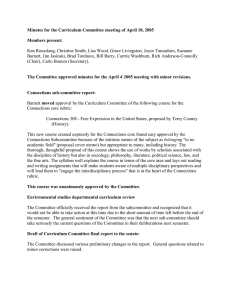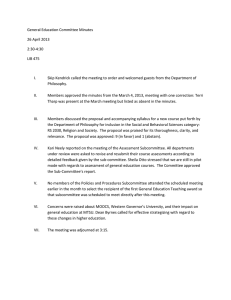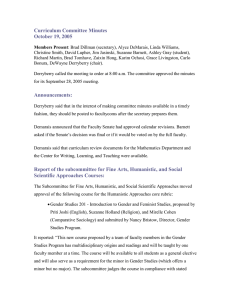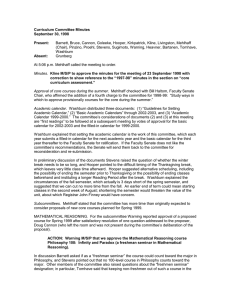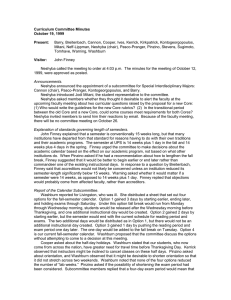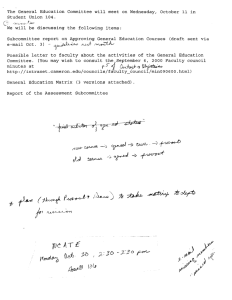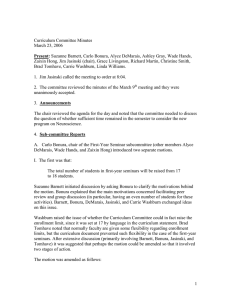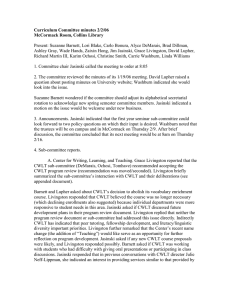Document 12290201
advertisement
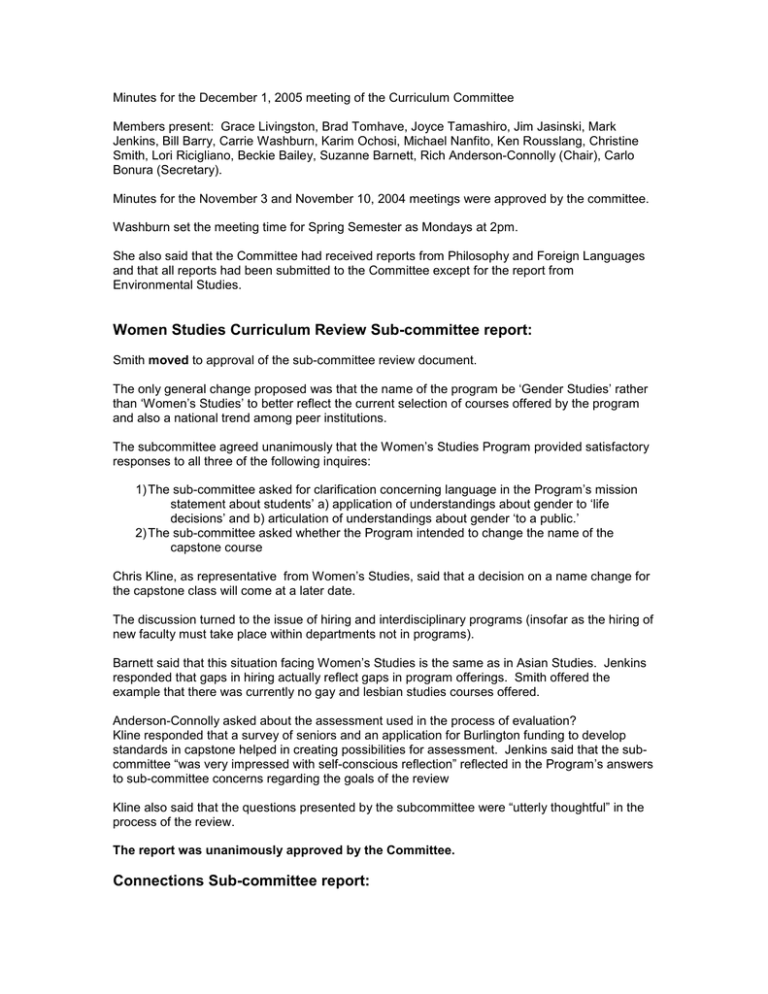
Minutes for the December 1, 2005 meeting of the Curriculum Committee Members present: Grace Livingston, Brad Tomhave, Joyce Tamashiro, Jim Jasinski, Mark Jenkins, Bill Barry, Carrie Washburn, Karim Ochosi, Michael Nanfito, Ken Rousslang, Christine Smith, Lori Ricigliano, Beckie Bailey, Suzanne Barnett, Rich Anderson-Connolly (Chair), Carlo Bonura (Secretary). Minutes for the November 3 and November 10, 2004 meetings were approved by the committee. Washburn set the meeting time for Spring Semester as Mondays at 2pm. She also said that the Committee had received reports from Philosophy and Foreign Languages and that all reports had been submitted to the Committee except for the report from Environmental Studies. Women Studies Curriculum Review Sub-committee report: Smith moved to approval of the sub-committee review document. The only general change proposed was that the name of the program be ‘Gender Studies’ rather than ‘Women’s Studies’ to better reflect the current selection of courses offered by the program and also a national trend among peer institutions. The subcommittee agreed unanimously that the Women’s Studies Program provided satisfactory responses to all three of the following inquires: 1) The sub-committee asked for clarification concerning language in the Program’s mission statement about students’ a) application of understandings about gender to ‘life decisions’ and b) articulation of understandings about gender ‘to a public.’ 2) The sub-committee asked whether the Program intended to change the name of the capstone course Chris Kline, as representative from Women’s Studies, said that a decision on a name change for the capstone class will come at a later date. The discussion turned to the issue of hiring and interdisciplinary programs (insofar as the hiring of new faculty must take place within departments not in programs). Barnett said that this situation facing Women’s Studies is the same as in Asian Studies. Jenkins responded that gaps in hiring actually reflect gaps in program offerings. Smith offered the example that there was currently no gay and lesbian studies courses offered. Anderson-Connolly asked about the assessment used in the process of evaluation? Kline responded that a survey of seniors and an application for Burlington funding to develop standards in capstone helped in creating possibilities for assessment. Jenkins said that the subcommittee “was very impressed with self-conscious reflection” reflected in the Program’s answers to sub-committee concerns regarding the goals of the review Kline also said that the questions presented by the subcommittee were “utterly thoughtful” in the process of the review. The report was unanimously approved by the Committee. Connections Sub-committee report: Barnett moved approval by the Committee of the following five courses for the Connections core rubric: 1. Connections 448 - Work and Well-being: Stress and Health in the Workplace, proposed by Kathi Lovelace (Business and Leadership) 2. Connections 306 - The Conflict Between Rhetoric and Philosophy, proposed by James Jasinski (Communication Studies) 3. Connections 315 - Democracy Ancient and Modern, proposed by Eric Orlin (Classics) and Melissa Bass (Politics and Government) 4. Connections 320 - Health and Medicine, proposed by Barry Anton (Psychology) 5. Connections 351 - Everything Causes Cancer - Statistical Arguments for Causation, proposed by DeWayne Derryberry (Mathematics and Computer Science) and Alyce DeMarais (Biology) Four of these five courses are newly created expressly for the Connections core. One course, Connections 320, has its origins in a team-taught SCXT course and thus benefits from the interdisciplinary expectations of that rubric in the old core curriculum. The two courses proposed by faculty teams (Connections 315 and Connections 351) will be team taught, accentuating the disciplinary mix inherent in the courses. All five courses satisfy the Connections requirements of multidisciplinary perspectives and engagement of the interdisciplinary process. Barry noted that it seemed that new courses pass the proposal process easily, whereas transition courses actually more difficult to propose successfully. The motion was passed by the Committee unanimously. Writing and Rhetoric Sub-committee report: Classics 120 “Persuasion and Power in the Classical World” was moved by the Writing and Rhetoric Subcommittee and approved unanimously by the Committee. Academic Calendar Subcommittee report: The subcommittee reported that its meeting went smoothly because a proposal for reforming the calendar had already been put together by John Finney. Finney’s proposal addressed all the concerns about the subcommittee regarding current problems with the calendar. The subcommittee endorsed the Finney proposal. Bonura summarized the major changes found in the new proposal: • semesters would have an equal number of days (70 days) • one extra fall break day, on extra day of Thanksgiving (the Wednesday before) • spring semester would start on a Friday, and the commemoration of Martin Luther King Jr. day would take place on the second Friday of the semester • reading period for both semesters would take place on the Monday of reading period rather than the Thursday and Friday of the week before Barnett defended the current reading period system by reminding the Committee that in 1986 the reading period was instituted to meet needs of students. Students must have time to get themselves together for final exam week. Barry cited the reading period and the lost of Wednesdays across the semester were big issues for faculty and that there were certain academic benefits that come with these changes, namely that the extra day of fall break would provide more of a real mid-term break and the change in reading period would all the post-thanksgiving period to be more substantial (with two full weeks of instruction). Barnett asked about the total number of class during a semester suggesting that the numbers endorsed by the subcommittee seemed high. Washburn explained that Finney’s research shows 140 days over the course of the school year is average for other comparable institutions. Jasinski suggested that it was a good idea to have equal days across the semesters, but that by adjusting spring semester graduation may now fall too early. This may mean that students have more difficulty finding jobs out of college. It also raises the question of how faculty use winter break. As the break is an important writing period for faculty, he suggested that it may be better st th to start on the 21 of January and end on the 17 of May. Barry acknowledged that classes could start later but also asked if faculty want longer summer. He also raised concern whether a late start would prevent the University from celebrating Martin Luther King Jr. day as a campus community. Barnett also commented that even if the University considers a longer break we should still celebrate Martin Luther King Jr. day. Washburn noted that Finney’s research looked at other schools that also changed the date on which they celebrate Martin Luther King Jr. day and found that it was common to shift the holiday to the Friday of that week. She also reminded the Committee that Martin Luther King Jr’s birthday does not coincide with the date of the national holiday. Bradhave reiterated one of the benefits of the new calendar was the equal number of days of instruction during the week. There would be an equal number of Mondays, Wednesdays and Fridays in a semester. Rousslang asked if the teaching hours were equal for those teaching MWF and MTTHF. Bradhave said they were in fact equal. All weeks are full weeks under the new calendar and this is made possible by working Labor Day. Jasinski said that Labor Day was an important holiday but other additional days off compensate for its loss. Jenkins inquired into the procedure approving the calendar. In terms of the dispute over the value of the reading period he argued that students just want the finals period over as soon as possible and that “reflection” and an intensity of preparation was not necessarily a reality for students during reading period. Anderson-Connolly replied that the Committee should reflect on this issue over break take up this issue again during our first meeting of 2005. Jasinski asked when these changes would go into effect: 2006-7. Barnett asked if our action was compatible with the Senate? Anderson-Connolly replied that this Committee was the only place reform of the calendar was being considered. Before the discussion came to a close, Rousslang raised the issue of students in the natural sciences being potentially faced with two back to back exams. The discussion of the academic calendar was tabled until after the beginning of spring semester so as to have more time for discussion. Science and Creative Inquiry Seminar Sub-Committee report: Ken Rousslang moved the Committee’s approval of the following two courses for the SCIS core category: 1) BUS 110, Business and the Natural Environment, Lisa Johnson, Business and Leadership 3) COMM 190, Discourses of Slavery, Jim Jasinski, Communication Studies Both courses meet the spirit and letter of the rubric of the SCIS core area. They both seem to be excellent courses that a) address a scholarly topic at the b) freshman level c) with a substantive written component, and with intellectual exchange between the students and the instructor. Lisa’s course explores the relationship between modern business management and the environment, especially addressing the social responsibility of business and environmental law. Jim’s course is a concerted evaluation of the institution of American slavery from a wide range of discourses, including judicial rulings, legislative enactments, and Biblical interpretations. Rousslang added that it was nice to read proposals that addressed guidelines specifically. The Committee unanimously approved this motion. Washburn recommended attendance at Freshfest in that seminars would really be accomplishing their goals as freshman seminars. Barnett reminded the committee that participation in freshfest serves as a form of assessment. Minutes prepared by Carlo Bonura
